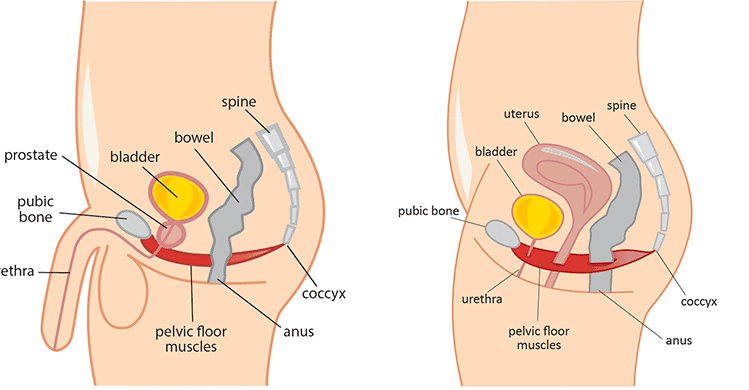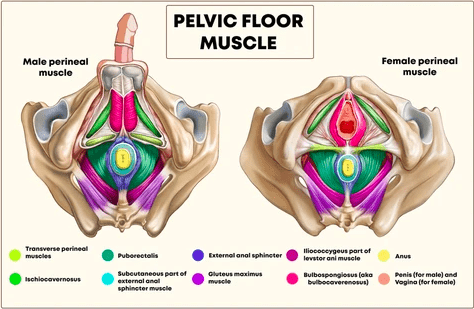Did you know there’s an entire specialty in Physical Therapy dedicated to pelvic and abdominal health? The Section of Women’s Health was founded in 1977 under the APTA and soon progressed to the Section of Obstetrics and Gynecology to address the Physical Therapy needs of women before, during, and after pregnancy. The name was later changed to Academy of Pelvic Health as the field recognized males affected by incontinence, pelvic pain, fibromyalgia, and osteoporosis.

*picture courtesy of pelvicfloorfirst.org
What is Pelvic Health?
Pelvic Health addresses the bony pelvis, the pelvic cavity and it’s organs, supporting ligaments, and the surrounding musculature known as the pelvic floor. The pelvic floor commonly refers to 3 layers of “sling-like” muscles that cross the bottom of the pelvis. The pelvic floor can also be known as the pelvic diaphragm. Pelvic Health also addresses other core and hip musculature including the rectus abdominus, transverse abdominus, multifidi, diaphragm and gluteal muscles.

*picture courtesy of yamunausa.com
What are the functions of the pelvic floor?
The pelvic floor is vital in sphincter control, sexual function, and reproductive health. Not only does it support the organs of the pelvic cavity and accommodate for pregnancies, it also provides stability to the sacroiliac joint, hips, and lumbar spine. The pelvic floor is essential in posture and breathing and provides a connection from the lower extremities to the lumbar spine to transmit loads from the ground up. It is safe to say the pelvic floor is an essential component to our core! Any laxity, weakness, tightness, or incoordination can result in pelvic floor dysfunction and other orthopedic injuries.
What are some conditions treated by Pelvic Floor Specialists?
- Urinary or bowel incontinence
- Constipation
- Fibromyalgia
- Oncology Rehab
- Pelvic organ prolapse
- Pubic Symphysis Dysfunction (PSD)
- Sacroiliac Joint (STJ) Dysfunction
- Pelvic pain
- Dysuria – painful urination
- Pre and post-partum injuries
- Peri and postmenopausal conditions
- Gynecological disorders including but not limited to endometriosis, PCSO, dysmenorrhea
- Reproductive health
- Orthopedic/musculoskeletal conditions
What are some signs and symptoms of Pelvic Floor Dysfunction (PFD)?
- Urinary dysfunction incontinence, urgency, dysuria, frequency
- Lumbopelvic pain
- Hip or groin pain
- Dysmenorrhea
- Dyspareunia – painful periods
- Dyspareunia – painful intercourse
- Constipation
- Chronic UTIs
What are some common myths about pelvic health?
“Pelvic health is only for women.” – Pelvic health is not subjected only to gynecological conditions. Males also have a pelvic floor and can experience symptoms of PFD such as urinary dysfunction, sexual dysfunction, and lumbopelvic pain.
“I do a bunch of kegels, so I don’t need pelvic floor rehab.” – PFD can be classified as underactive, overactive, or uncoordinated. If your pelvic floor is overactive, you may need relaxation techniques and manual therapy you’re your pelvic floor is lacking coordination, you may require neuromuscular re-education, posture re-training, and functional training.
“It is normal to leak a little urine with laughing, coughing, jumping, or running.” – Leaking urine during any daily activity is abnormal and a common sign of PFD.
When to see a specialist?
If you’re experiencing any of the above symptoms or traditional treatment for low back, hip, or groin pain has proven unsuccessful, speak to your Primary Care Physician about your interest in Pelvic Floor Health. Or visit here to find a specialist near you!
https://ptl.womenshealthapta.org/
https://pelvicrehab.com/
utm_source=hermanwallace.com&utm_medium=referrral&utm_content=findapractitioner
References
https://aptapelvichealth.org/about/
http://www.pelvicfloorfirst.org.au/pages/working-your-pelvic-floor.html
https://www.yamunausa.com/blogs/womens-wisdom/your-pelvic-floor-muscles
https://ptworks.ca/pelvic-floor-core-control-more-than-just-kegels/
